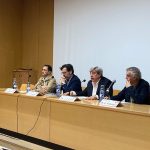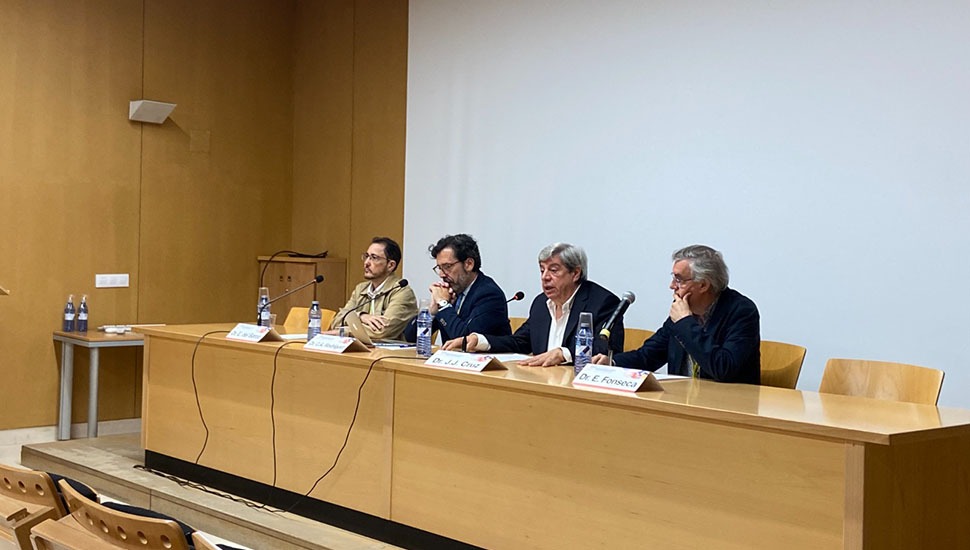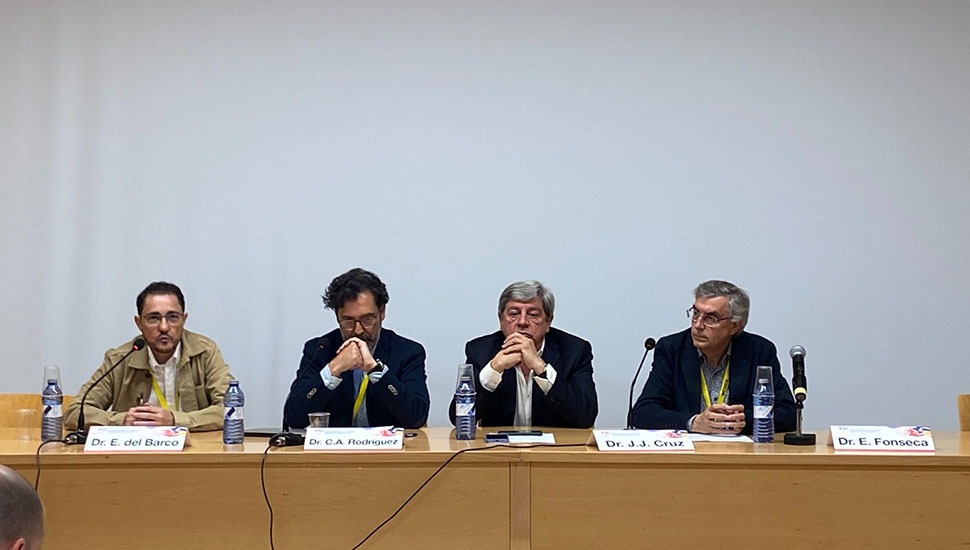

For two days they will meet at the University of Salamanca near 200 oncology professionals in the countryto share the latest scientific news and the most relevant advances in the field of oncological treatments.
He XVI Symposium Biological Bases of Cancer and Therapeutic Innovation focuses the debate of experts around the most innovative therapies and their potential impact in the fight against cancer. “This year is going to be much more multidisciplinary. Pathologists, radiologists, oncologists, microbiologists… and the time for discussion will increase.”
The scientific directors of the Forum, Dr. Juan Jesus Cruz Hernandezemeritus professor at USAL and founder of the event, Dr. César A. Rodríguez, Head of the Medical Oncology Unit at the University Clinical Hospital of Salamanca-IBSAL and president of SEOM; and the doctor Emilio FonsecaHead of the Medical Oncology Service at the University Clinical Hospital of Salamanca-IBSAL and Full Professor at USAL and doctor Edel del Barco, Head of the Medical Oncology Unit at the University Clinical Hospital of Salamanca-IBSAL; have highlighted, in the press conference in which they presented the Forum to the media today, the important role of two therapeutic areas in constant evolution: immunotherapy and molecular therapy.
Advances in research in these two areas are transforming the care patients receive and expanding treatment options beyond chemotherapy. In this sense, Fonseca has expressed that the evolution of oncology today “cannot be understood” without precision medicine and advances.
“It is very important to have these tools to provide the patient with the best type of treatment.” Fortunately, the Salamanca Hospital has the Mass Sequencing, “which allows us to analyze the molecular alterations that tumors have. A test that goes hand in hand with Pathological Anatomy, which has the tools to do it.”
Afterwards inside the Tumor Committee, which is made up of pathologists, oncologists, biologists… “the most appropriate decision is made. We cannot conceive of treating tumors without having those tools that allow us to provide the best type of treatment.” Furthermore, doing a much more accurate diagnosis of the disease, also detecting the familial risk of mutations.
It has also given special importance to the early detection. “We must continue to stimulate the population to prevent tumors from appearing or to be able to increase survival in the case of suffering from it.”

New treatments, more personalized and less invasive
According to the scientific directors of the Symposium, Immunotherapy emerges as a promising strategy by harnessing the immune system to fight cancer“rather than directly attacking cancer cells like chemotherapy or radiation therapy does.”
Whiletherapies directed toward specific molecular alterations offer a more personalized and less invasive approach, adapted to the characteristics of each tumor and patient. Given these advances, molecular diagnosis and massive sequencing techniques play a crucial role in the identification and classification of tumors, to improve the search for personalized therapeutic options.
Although, as the doctors highlight, “the challenge continues to be the need for greater collaboration between scientific and clinical disciplines, as well as obtaining adequate financing for complex studies, which guarantee that the results of the research will translate into benefits.” tangible for patients. To take full advantage of new emerging cancer treatments, it is crucial to continuous communication and education of health professionals.
Medical conferences, such as the Biological Bases of Cancer and Therapeutic Innovation Symposium, scientific publications and medical education programs play a fundamental role in disseminating the latest advances.
Personalized treatment
Cesar Rodriguez has highlighted that over the years the approach to tumors has changed towards a more personalized treatment through biomarkers. “We do not treat as we did 20 years ago… with generic treatments for everyone the same. “Molecular diagnosis and an individualized approach based on the pathological characteristics of each tumor is now a reality.”
“Breast cancer is many breast cancers, in the lung there is an arsenal of specific treatments aimed at specific mutations… we are going to talk about all of this these days,” has stood out. There are also transversal themes, “that affect various tumors regardless of the organ in which they occur.”
“There will be a talk about mutations in RAS, which is one of the lines of research carried out by the Cancer Research Center. In the not too distant future, and in some cases it is already a reality, there will be tumors that we treat not because of the organ in which they live but because of their molecular alterations.”
Liquid biopsies research
For its part, Edel del Barcohas given special importance to multidisciplinary team. “I want to highlight the work of Hospital Molecular Tumor Committee where molecular aspects and patient treatments are decided based on specific and very novel markers.”
He has not forgotten the research in liquid biopsies. “To be able to characterize tumors, make decisions and give a diagnosis through peripheral blood biopsies. Immunotherapy and molecular therapy are therapeutic lines that are beginning to be used not only in metastatic tumors., we are already able to apply them in earlier stages of the disease. There are a large number of patients who are cured.”
In this sense, Juan Jesus Cruz, took the opportunity to remember a phrase that says: “Cancer is a nightmare because your own cells alter and attack you and kill you.” “With Immunotherapy the nightmare is being reversed. We make our own cells, those of immunity, capable of killing those cells that were going to kill you.”
“Immunotherapy may possibly be the treatment that ultimately, of all things, puts an end to the nightmare of cancer.”
As he explained in statements to the media, ““The tumor cells have proteins that the body detects as foreign, which causes the affected organ to begin to not function and that allows the cancer to progress.”
“What immunotherapy has achieved has to do with the brakes that prevent the defenses from attacking the tumor cells. We have begun to discover what steps these brakes take to remove them,” has clarified, remembering “which is what the election of the 2018 Nobel Prize was based on, achieved by the North American James P. Allison and the Japanese Tasuku Honjo.”
The challenge, guarantee equitable access for all patients in the country
These advances promise to transform the landscape of cancer treatment in Spain, especially in the early stages of the disease. However, as the directors of the Symposium state, they consider challenges in terms of equitable access to these innovative therapies and in the development of more accurate predictive biomarkers, for all patients.
Likewise, experts affirm that primary prevention and early detection continue to be fundamental in the fight against cancer, therefore, multidisciplinary collaboration and the implementation of molecular diagnostic techniques take special importance to improve the results and quality of life of the patients.
Collaboration, the challenge of the future in the fight against cancer
As the directors of the Forum stated in the press conference, collaboration between researchers, doctors and other health professionals is essential to address the challenges in advancing the fight against cancer in our country.
Sharing information, analyzing data and applying new technologies, such as big data analysis and artificial intelligence, could help maximize the benefits of the advances made. In the future, addressing these challenges will be crucial to ensure equitable access to cancer therapies and improve treatment outcomes in Spain.
Physical exercise
On the last day there will be a table open to professionals and the general public. In recent years it has been shown that physical exercise not only improves the physical and emotional well-being of patients, but also influences the response to treatments.


